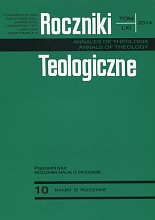Is Canon Law an Instrument of Neo-Colonisation? Reception of Canon Law in Africa and the Contribution of John Paul II
Is Canon Law an Instrument of Neo-Colonisation? Reception of Canon Law in Africa and the Contribution of John Paul II
Author(s): Israel Madziakaphwa, Robert LeżohupskiSubject(s): Christian Theology and Religion
Published by: Towarzystwo Naukowe KUL & Katolicki Uniwersytet Lubelski Jana Pawła II
Keywords: neo-colonialism in Africał canon law in Africał an instruents of neo-colonialism
Summary/Abstract: The thought of conveying Fr. Israel Madziakaphwa's paper was borne during Canon Law classes the in the group of brilliant, young students preparing themselves to receive in short licentiate in Canon Law. Analysing the African heritage of John Paul II, focus is given unusual attention on the issue of inculturation, and birthed issues such as the reception of Canon Law in Africa. The topic, analysed and discussed with the students was later on proposed as the opening one for the 1st international videoconference held in conjunction with Catholic University of Lublin, Faculty of Law, Canon Law and Administration. It was distinguished by the keys of: 1. Understanding Canon Law in general: 1.1. Canon Law: Universal ordinance of the Church; 1.2. Provision of particular laws in the Church; 2. African understanding of law in general: 2.1. Perspective of Canon Law in the African Church; 2.2. Revision of the 1983 Code: The Africans' participation; 2.3. Customary law and canonisation of “civil law”; 3. Received or rejected? Reaction to Canon Law: 3.1. Canon Law (NOT) an Instrument of neo-colonisation; 3.2. African particular laws: a contribution to the canonical tradition; 3.3.Contribution of John Paul II to the reception of Canon Law in Africa. That still remains the main structure of presentation. Most importantly, we highlight the precise analysis of the paper that in answering the question of neo-colonialism in law we're asking ourselves about the spirit of law and rejecting this term as the outline of cultural imperialism In discussing Canon Law we put emphasis on unitas in varietatem, unity in diversity, that doesn't mean uniformity. Principles of inculturation remain the same: ratio legis – in our case – salvation of souls; sentire cum Ecclesia and subsidiarity. I hope this research will be a helpful instrument in facilitating, the evasion of “colonialism” in terms of “cultural imperialism” and always speak to the people (this time we mean Africans) in their “own language, being totally aware, that it's always a kind of dismixture and challenge.
Journal: Roczniki Teologiczne
- Issue Year: 61/2014
- Issue No: 10
- Page Range: 129-141
- Page Count: 12

